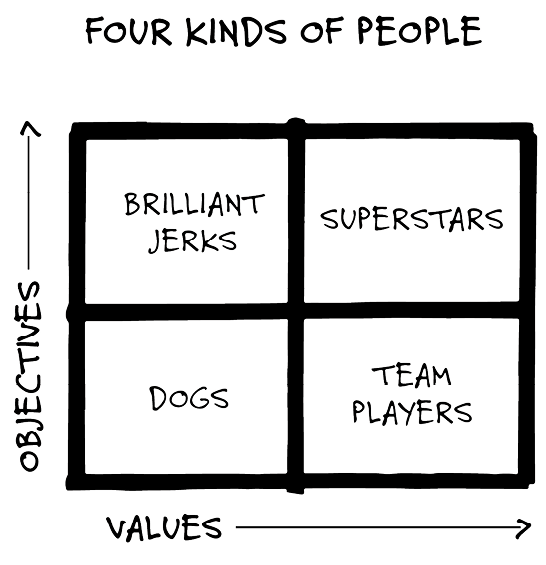
Chapter 10
Superstars, dogs, team players – and those brilliant jerks
During my time in management, I have observed that people always fall into one of four categories.
1. Superstars, who meet their objectives and share the values of the company.
2. Dogs, who neither meet their objectives nor share the values of the company.
3. Team players, who share the values of the company but do not meet their objectives.
4. Brilliant jerks, who meet their objectives but do not share the values of the company.
Dealing with superstars and dogs is in fact really easy. Make sure that you do whatever it takes to keep the superstars, and get rid of the dogs as quickly as possible.
With wages probably your largest monthly expense, being able to both grow and keep your star performers is critical. Losing a star performer can leave a massive void in a company. Research shows that replacing a star performer can cost a business two to three times the worker’s salary. Star performers can deliver 400 per cent more in productivity than your average employee, so losing a star can have a massive impact on your ability to build your product and generate revenue. A replacement can take months to get to the same level of performance as the high-performing employee – as a startup, you just don’t have this kind of time on your side.
Because I considered Com Tech as a family, I always worried that if I asked someone to leave the company – even a dog – it may have a negative impact on our culture. How wrong I was. I believe I sometimes lost respect as a manager because I didn’t make the tough decisions soon enough. My strong recommendation is always to be fair first and tough second – but don’t err on the fair side for too long, a mistake I often made.
Whenever I held a management meeting, I would ask our managers to think of a situation where they had believed someone was not the right person for the company but had allowed them to stay on, rather than removing them. Had they ever found themselves, two years down the track, saying: ‘Lucky I never got rid of Jack, he has become an absolute superstar’? Never in my career have I known that to happen. When you know something is not right, it’s not right. Think about your own career – can you think of anyone like that?
Team players are the second-toughest group to deal with – maybe a salesperson who missed their number for a quarter, or a software engineer who has bugs in their software. They are great company people, but haven’t met their KPIs or OKRs (objectives and key results) or whatever system you use to manage your team. You have to give this team player another go and see whether you can educate them, to help get them into the top right quadrant of the diagram on page 88. If you can’t, it’s probably best for them and the company that you part ways.
The toughest group that a manager has to deal with are those brilliant jerks – they may include your best salesperson or your most competent engineer, but these people are not willing to be part of the team. They just don’t fit the culture. Think of a star footballer, someone who believes they are so good they don’t have to attend practice, so special they don’t need to wear the team kit when travelling – but hey, this is your champion player. You may think your company can’t survive without this person, but your culture won’t survive with this brilliant jerk on board. You lose credibility as a founder if you are willing to let someone do whatever they want even when it is contrary to the values of the company. As hard as it is, this person has to go – no one is bigger than the team.
Recently I was invited to be guest speaker for a company in the real estate industry. Their star performer didn’t pitch up for the management meeting and dinner on the Monday night. The conference kicked off at 10.00 am on the Tuesday, and the brilliant jerk arrived at … 10.15. What example was this setting for the rest of the company? Why did everyone need to be there at 10 am if the brilliant jerk could arrive whenever he wanted? He’s no longer with the company. I know the founder was a bit apprehensive about letting him go, but I’m confident that in a few years he will look back on it as one of the best decisions that he has made.
I should add that a brilliant jerk in one company may be a superstar in another – every company has its own unique culture.
• • •
